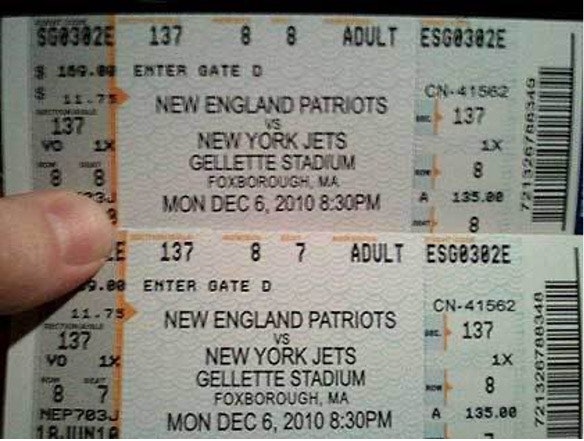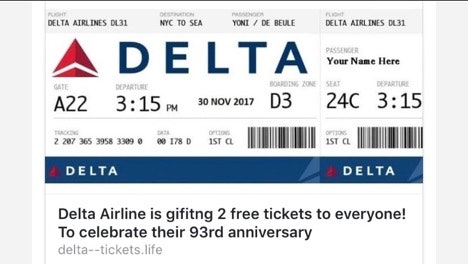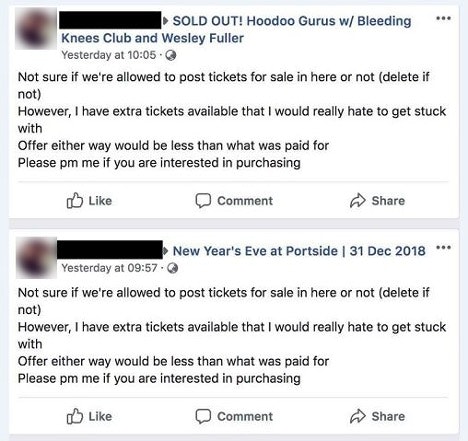- What Are Fake Ticket Scams?
- How to Beat and Avoid Fake Ticket Scams
- Examples of Fake Ticket Scams
- What to Do if You’ve Fallen for Fake Ticket Scams
- Frequently Asked Questions
The best way to avoid buying fake tickets is to only buy from official sellers. While it may be tempting to buy cheap tickets from sellers on sites like Craigslist and Facebook Marketplace, you open yourself up to being scammed.
Knowing how these scams work and red flags of fake tickets to watch out for can help you avoid buying tickets that are no good.
What Are Fake Ticket Scams?
If you’ve ever shopped for tickets online, you know how exciting it can be to find a good deal. Scammers, unfortunately, know that too, which is why fake ticket scams are so prevalent. Last year alone, the Better Business Bureau (BBB) received more than 200 reports about ticket scams relating to sporting events, concerts, theater, and more.
Here’s how these scams work.
You Find Tickets for Sale Online
You’re searching online for tickets to an event, perhaps on Facebook or Craigslist, and find what you believe to be a valid offer. You might also find the tickets on a website that bills itself as a legitimate reseller but isn’t. The event might already be sold out, or the tickets might not be officially for sale to the general public.
If you’re shopping for airline tickets, the scam looks a little different. While searching for cheap flights, you find a good deal with a major airline, or perhaps you find airline tickets on a travel website offering airfare deals.
Example Facebook PostTICKETS TO SOLD OUT GAME! I really need to get rid of these four tickets to the LA Lakers game happening this weekend. I was planning on going with my friends but something has come up and now I can't go. I'll sell these for what I paid for them. The game is SOLD OUT, so get in quick. PM me for info.
You Pay for the Fake Tickets
If you’re buying from an individual seller, you pay for the tickets using PayPal or another third-party service. Alternatively, the seller might request that you pay via wire transfer or gift card. If you’re buying airline tickets, you’ll use your credit card and pay on the website where you found the tickets.
The Tickets Don’t Arrive, or They Are Fake
Instead of receiving tickets, you’re left empty-handed. Or you might receive tickets that you don’t realize are fake until you’re denied entry at the door to the event.
If you’re purchasing airfare, you might receive a confirmation email, but not the tickets. When you call the airline to confirm the booking, you find out they don’t have any record of your booking. The scam company might even call to alert you of a sudden price increase or an extra charge needed to finalize your booking.
You Lose Your Money
Once your money is in the hands of the scammers, you face an uphill battle to get those funds returned. In addition, if you share any personal information, such as credit card details, your identity, and financial information could be at risk.
How to Beat and Avoid Fake Ticket Scams
Fake ticket scams take advantage of consumers who want to snag an excellent deal for in-demand events and airline tickets. Unfortunately, it can be tough to tell whether online tickets are legitimate or fake.
The best way to beat fake ticket scams is to:
- Only buy from trusted vendors
- Shop only on secure websites
- Only pay using a credit card (that offers fraud protection)
- Inspect the ticket before you buy it (if possible)
Buy From Trusted Vendors
Make it a point to only buy tickets online from vendors you trust and offer a money-back guarantee, such as Ticketmaster or StubHub. Check the event’s official website for a listing of official ticket distributors. Avoid buying from strangers on Facebook or Craigslist. If you receive an email or see a social media post advertising tickets, don’t click through on any links—scammers can create web addresses that mimic well-known ticket sellers.
If you’ve never heard of a company where you’ve found tickets, do your research before making the purchase. Look up the company on the Better Business Bureau to see what other consumers have to say about it.
Shop Only on Secure Websites
If you’re buying tickets online and entering your payment information, make sure the site is encrypted for payment. You’ll know it’s secure if:
- You see a closed padlock in the website address bar
- The URL should also start with “https” to indicate its security
Use Your Credit Card for Online Purchases
You’ll have an added layer of security if you choose to use your credit card when buying tickets online. Usually, you can dispute a charge if the purchase turns out to be fraudulent. If someone wants you to make a bank transfer or use a gift card to pay for tickets, that’s typically a sign of a scammer.
Inspect Tickets Before You Buy
If you’re buying tickets for a sporting or entertainment event, check the event date and time. Legitimate tickets should also list the section and seat numbers. Look at a map of the venue to verify that these seats exist.
Red Flags of Fake Ticket Scams to Watch Out For
It can be fun and exciting to shop for tickets online. Stay safe as you’re shopping for tickets by staying aware of the following red flags:
- Tickets available on third-party sites for sold-out events
- Requests to pay by bank transfer
- Requests to pay by gift card
- Websites with no working customer service number or physical address
- Typos and grammatical errors
- Prices are higher than the face value of actual tickets
- Pushy sellers who are in a rush to unload tickets
- Sellers who refuse to show you the actual ticket
Offers of Tickets for Sale for Sold-Out Events
The scammer knows that the event is popular and in demand and may already be sold out. They’re banking on desperate consumers who want to purchase the tickets and might be willing to overlook the signs of a scam.
Although not all of these tickets are fakes, you should be extra cautious.
Requests to Pay by Wire Transfer
Scammers might request that you pay by wire transfer since it’ll be more challenging—and maybe even impossible—for you to get your money back once you find out it’s a scam. Wire transfers are harder to track, and once the recipient has claimed the money, you can’t cancel the transaction, which is why it’s a popular payment method amongst scammers.
Requests to Pay by Prepaid Gift Cards
Scammers prefer untraceable payment methods, so they might request that you pay them by gift card, such as an Amazon gift card. Any person, even those outside of fake ticket scams, who demands payment via prepaid gift cards is most likely a scammer.
People or websites that require payment for tickets in cash, wire transfer, or prepaid gift cards should be avoided. When buying tickets, you should always pay via a traceable method covered by fraud protection (e.g., credit card or PayPal).
Websites With No Working Customer Service Number or Physical Address
Scam websites might appear real but look closely. They probably won’t have a working customer service number or physical address listed. If they do list an address, Google it to make sure it’s a real place.
Typos and Grammatical Errors
Sloppy grammar and spelling are other signs of a ticket scam website. You also may notice that the website and wording might lack a professional appearance.
Prices Are Higher Than the Face Value of Actual Tickets
Scammers charge much higher prices for their fake tickets because they know people rush to buy. Of course, higher-priced tickets aren’t a sure sign of a scam, but it should warn you to proceed with caution.
Sellers Are in a Rush to Unload Tickets
Scammers typically mention last-minute emergencies to explain why they need to sell tickets quickly. They generally do this to stop you from doing your research and figuring out that they’re actually selling fake tickets.
Sellers Refusing to Show You the Ticket
If you’re buying from an individual seller, ask to see a photo of the ticket so you can confirm it exists and that it’s real. You can also ask for the ticket number so you can confirm with the official ticket seller that it’s legitimate.
Examples of Fake Ticket Scams
At first glance, these tickets to a New England Patriots football game might look real until you look closer and realize that the location, Gillette Stadium, is misspelled. In addition, there is no Gate D at the stadium.

The following is an example of a fake ticket scam for Delta Airlines. You might spot this in an online advertisement, social media post, or email. Notice the grammar and spelling errors, as well as the “too good to be true” factor—no airline would celebrate its anniversary by giving away free tickets to everyone.

On Facebook, scammers might post in multiple groups about tickets they need to sell quickly. In the following example, the scammer targeted Facebook pages with “SOLD OUT” in the title.

What to Do if You’ve Fallen for Fake Ticket Scams
Fake ticket scams are serious—not only will you lose your money, but you may not even know you have a fake ticket until you’re at the venue or the airport. Taking immediate action gives you a better chance of having your money refunded and, hopefully, helping the authorities catch the scammer.
If you’ve fallen for the scam, you should:
- Dispute the charge
- Report the fraud to the authorities
- Report the scam to the website or the BBB
Dispute the Fake Ticket Charge
Report the fraudulent charges immediately to your bank or credit card company. You may need to open up a formal dispute to get the money returned. Also, cancel your card and request a new one, especially if you shared your credit card information with the scammer.
Report the Scam to the Authorities
You can report the scammer to the following authorities:
- Your local police
- Your state consumer protection office
- The Federal Trade Commission (FTC)
Report the Fake Ticket Scam to the Website or the BBB
If you bought tickets off a classified website like Craigslist or Facebook Marketplace, report the scam to the site directly. This won’t help you get your money back, but it will report the scammer’s profile and get the post taken down.
If you bought fake tickets from a scam website, report it to the Better Business Bureau. This will help others from falling for the same scam.


Comments